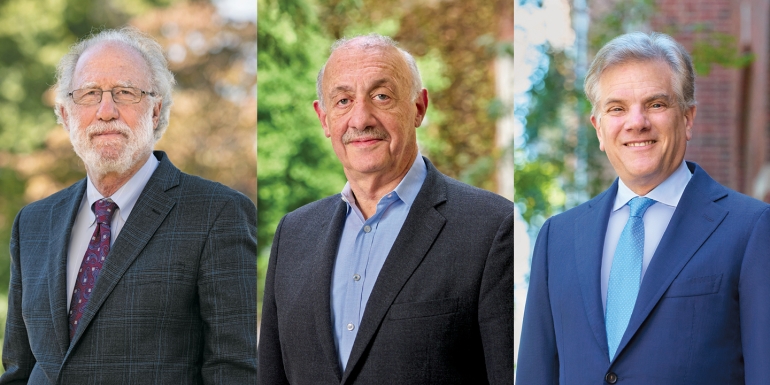Leading NYU legal scholars launch Democracy Project
NYU School of Law today announced the launch of the Democracy Project, formed to pursue research and convene conversations on democratic governance in an age of polarization and extremism. NYU Law Professors Bob Bauer, Samuel Issacharoff, and Richard Pildes—three of the nation’s foremost experts in the field of the law of democracy—will serve as founding faculty directors of the Project.

To mark its debut, the Project is launching the “100 Ideas in 100 Days” series, which will offer a fresh take on the state of democracy from a select group of top scholars, public officials, practitioners, and thought leaders from across the political spectrum. Contributors to the series include Jake Sullivan, former national security advisor to President Joe Biden; former New Hampshire Governor Chris Sununu; former Office of Management and Budget Director Shalanda Young; businessman Mark Cuban; Harvard Law School Professor Randall Kennedy; Stanford Law School Professor Michael McConnell; and University of Oxford Professor Kate O'Regan.
“One of the most important roles we can play as an educational institution is to provide a platform for a broad range of perspectives on vital issues of the day, including in particular those that sharply divide us,” says Dean Troy McKenzie ’00. “The 100 Ideas series is a concrete demonstration of how the Democracy Project can foster this kind of dialogue. Scholarship is also a core component of the Project’s mission, and I know that the work produced under Bob, Rick, and Sam’s leadership will be rigorous and cutting edge.”
In examining threats to democracy around the world, the Democracy Project will work outside the current ecosystem of political reform programs and organizations. The Project plans to publish original academic work and fresh thinking on pressing issues such as the boundaries of executive power, congressional capacity in an era of hyperpartisanship, the role of political parties, and the challenges facing democratic governments in delivering effectively on the issues their citizens care about most. It will endeavor to bring the best available research to bear in the evaluation of proposals for electoral and governmental reform. Comparative work will be central to the Project’s approach, drawing on recent developments in Western and Central Europe to inform an understanding of what is happening in the United States.
In a joint statement, Bauer, Issacharoff, and Pildes say: “Dissatisfaction with democratic government has been pervasive for the last decade throughout the West. Our aim in launching the Democracy Project is to engage this challenge along many dimensions, from diverse ideological perspectives, and across national boundaries.”
Bauer, who served as White House counsel from 2009 to 2011, is a professor of practice and distinguished scholar in residence at the Law School. He is a leading expert on executive power and co-author of After Trump: Reconstructing the Presidency (2020), the author of The Unraveling: Reflections on Politics Without Ethics and Democracy in Crisis (2024), and co-founder of Executive Functions, a Substack devoted to executive power issues. Issacharoff, Bonnie and Richard Reiss Professor of Constitutional Law is a leading expert on democracies and constitutions worldwide and author of Fragile Democracies: Contested Power in the Era of Constitutional Courts (2015) and Democracy Unmoored: Populism and the Corruption of Popular Sovereignty (2023). Pildes, Sudler Family Professor of Constitutional Law, is the nation’s most cited scholar on election law, a leading expert on American government and democratic governance worldwide, co-editor of Electoral Reform in the United States: Reforms for Combatting Polarization and Extremism (2025), and a member of President Biden’s Commission on the Supreme Court of the United States and the bipartisan ABA Task Force on American democracy.
Rosa Po will serve as the Project’s executive director. Po, who has a JD from Yale University, has held senior roles in the White House and US Senate. Those interested in reading pieces from the 100 Ideas series can sign up to receive them on the subscription page.

